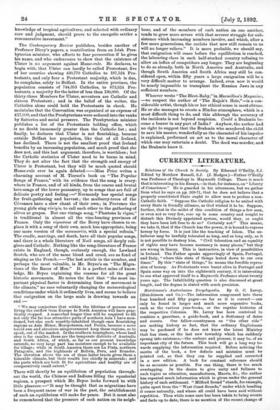CURRENT LITERATURE.
was Professor of Theology in Maynooth College. There is much that is interesting in his Essays,—in that, for instance, on" Liberty of Conscience." He is guarded in his utterances, but we gather from what he says on pp. 269-71, that he does not believe that a. properly constituted State ought to allow men to profess a non- Catholic faith. "Suppose the Catholic religion to be united with every State in friendly alliance, as God wished it to be. Suppose, further, that in the midst of this condition of things a few men, or even not so very few, rose up in some country and sought to disturb this Divinely appointed system, would they, or ought they have been left free to do so P Certainly not." This means, we take it, that if the Church has the power, it is bound to repress heresy by force. It is just like the teaching of Islam. The an- believer may be lawfully tolerated as long, and as long only, as it is not possible to destroy him. "Civil toleration and an equality of rights may have become necessary in many places," but they are wrong in theory. This is instructive, in view of possibilities in Ireland. The Father speaks approvingly of Spain, Portugal, and Italy, "where this state of things lasted down to our own times." By this "state of things," he means the forcible repres- sion of heresy. As Protestants were burnt alive in Portugal and Spain some way on into the eighteenth century, it is interesting to see what approved itself to a Maynooth Professor about twenty years ago. The Infallibility question is also discussed at great length, and the dogma is stated with much precision.










































 Previous page
Previous page